Curated OER
social Studies: Yesterday, Today, and Tomorow
Sixth graders take an Internet trip back in time to explore ancient cultures. Working in teams, they assume the roles of theologian, cartographer, economist, political analyst, and anthropologist. The same groups then create time...
Curated OER
The Forgotten Cities
Students recognize and identify gaps in historical and archaeological evidence and how that evidence is interpreted. They explore the history of the Indus cities and identify what was left behind that survived for archaeologists to find...
Curated OER
Saving the Past for the Future
Students examine the need for preservation of archaeological resources. They discuss and propose possible solutions to a given ethical dilemma.
Curated OER
Gridding a 2 x 2 Meter Unit
Learners use the internet to examine what happens at an archeological dig site. In groups, they practice measuring a 2x2 meter square unit and gridding it out as an archeologist would do. They review the possible solutions at the end of...
Curated OER
Trekking to Timbuktu
Students view a television show to provide a context for conducting research into the location and culture of Timbuktu. The students complete a report on the subject in the form of a research paper.
Curated OER
How to "Read" an Artifact
Students discuss the types of information they can get from artifacts. In groups, they practice "reading" artifacts and determining their usage. They use inferences to test against official information about certain pieces. They also...
Curated OER
Ceramics: A Vessel Into History
Students review a previous ceramics lesson and journal about a personal clay vessel they will create. In this ceramics lesson, students recognize various ceramic forms created in different time periods and cultures and how ceramic...
Curated OER
Inventions over Time
Sixth graders examine inventions, such as spear points and bows and arrows, and discuss their importance in human cultural development. They compare these early inventions with modern ones and determine the impact of science and...
Curated OER
Ceramics: A Vessel into History
High schoolers create a personal clay vessel that has a specific use or meaning in their contemporary culture, which could be discerned through study by future archeologists and art historians.
Curated OER
Ancient Highways-Native Byways of Salmon Lake State Park
Eighth graders investigate the concept of the trail system used by the Native Americans. They compare and contrast the trails to modern transportation roadways of today. Students also define the types of information archaeologists use to...
Curated OER
Past v. Present: Using Geography & Anthropology
Students examine artifacts and documents from their Canadian community. They analyze early Canadian history and make predictions about the future of the country.
Curated OER
AIH-14: Changes to American Indian Cultures
Students explore American Indian cultures and changes caused by European exploration in North America.
Curated OER
Stone Tools of Texas Indians
Provide background information regarding the use of stone tools from the paleoindian through the late prehistoric periods. Learners can read this informational passage to gain insight on how and why we study these amazing artifacts from...
University of Chicago
Ancient Egyptians and Death
What archaeological evidence remains of ancient Egyptian burial and mortuary practices, and what can this information tell us about ancient Egyptian society?
Curated OER
Where is it?
Students use a coordinate grid. They investigate and discuss what caused certain objects to be in specific places. They choose a room in their home to map and place objects in specific locations.
Curated OER
Ancient Times
Students create a mural depicting modern life. In this ancient civilizations instructional activity, students view images of wall painting from ancient civilizations showing aspects of their daily life. Students discuss the ways our life...
Curated OER
What Can We Learn From the Past?
Learners observe items from their past, making inferences and observations about their own culture based on these artifacts. Students then share with the class what they learned about their own culture, giving all learners more...
Curated OER
Modern Greece Fights For Ancient History
Students study the history of Ancient Greece and its society through Internet research. They investigate information about the Parthenon and its marble structures.
Curated OER
Layers of Time in the Earth
Students are introduced to the concept of stratification as a historical and geological process. Students will read about the Richard Beene archaeological site, which lies near San Antonio, Texas on the Medina River, and watch a short...
Curated OER
The Museum as a Time Capsule: Mongolian Example
Students make defensible inferences based on observation of perceived evidence. They use observation and inference to recognize the validity of alternative approaches or solutions.
Curated OER
Why is the Past Important?
Students explore, examine and study why it's important to study the past and connect this importance with reasons why we should learn from the past and how cultures have changed over the years. They bring an object, photograph or a...
University of Chicago
The Oriental Institute Museum: Life in Ancient Mesopotamia [Pdf]
Because archaeologists cannot take home all the objects they unearth, they must make detailed, accurate drawings of their finds, so that these artifacts can be studied in the future.














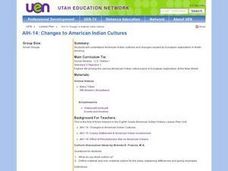

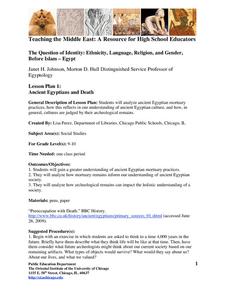
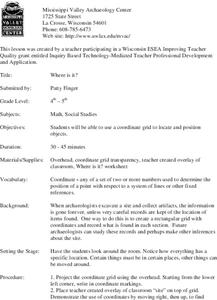
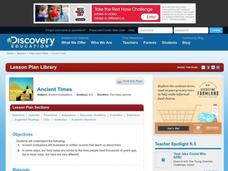




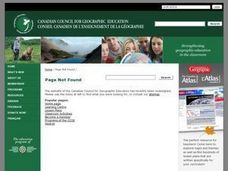
![The Oriental Institute Museum: Life in Ancient Mesopotamia [Pdf] Lesson Plan The Oriental Institute Museum: Life in Ancient Mesopotamia [Pdf] Lesson Plan](https://d15y2dacu3jp90.cloudfront.net/images/attachment_defaults/resource/large/FPO-knovation.png)